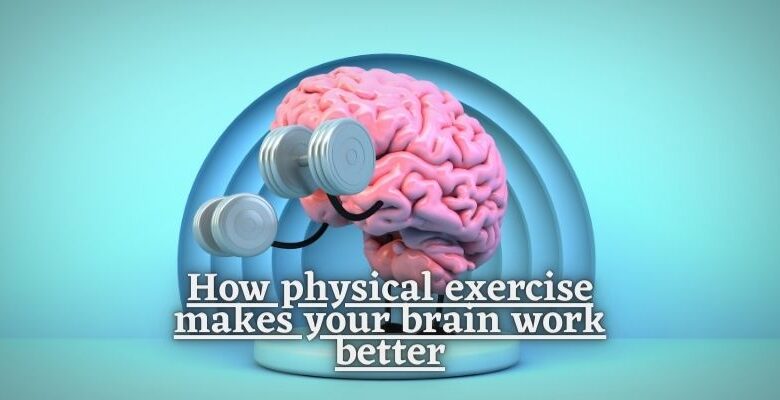How Physical Exercise Makes Your Brain Work Better

In our fast-paced and sedentary lifestyle, finding ways to enhance our brain function and improve cognitive abilities is crucial. Physical exercise has long been known for its numerous benefits on the body, but did you know that it can also significantly impact your brain? In this article, we will explore the fascinating relationship between physical exercise and brain health, and how incorporating regular exercise into your routine can boost your mental prowess.
The Link Between Physical Exercise and Brain Health
Physical exercise has a profound impact on our brain’s health and function. Several mechanisms contribute to this connection.
1.1 Exercise and Neurotransmitters
When we engage in physical activity, our brain releases a surge of neurotransmitters, including endorphins, dopamine, serotonin, and norepinephrine. These chemicals play a crucial role in regulating mood, reducing stress, and promoting feelings of happiness and well-being.
1.2 Increased Oxygen and Blood Flow
Exercise stimulates blood flow, delivering essential oxygen and nutrients to the brain. This increased blood flow enhances brain function, improving cognitive abilities such as memory, attention, and problem-solving.
1.3 Neurogenesis and Brain Plasticity
Regular exercise promotes neurogenesis, the growth of new brain cells, particularly in the hippocampus, a region associated with memory and learning. Additionally, exercise enhances brain plasticity, allowing neurons to form new connections and strengthen existing ones, leading to improved cognitive performance.
2. Cognitive Benefits of Exercise
The cognitive benefits of exercise are far-reaching and can positively impact various aspects of our mental capabilities.
2.1 Improved Memory and Learning
Studies have shown that aerobic exercises, such as running or cycling, can enhance memory and improve the brain’s ability to learn and retain information. Exercise stimulates the release of a protein called brain-derived neurotrophic factor (BDNF), which supports the growth and survival of brain cells, particularly in the hippocampus.
2.2 Enhanced Focus and Attention
Engaging in physical exercise has been found to sharpen focus and improve attention span. The increased blood flow and release of neurotransmitters during exercise help enhance cognitive processes related to concentration and mental clarity.
2.3 Reduced Stress and Anxiety
Exercise is a natural stress reliever. It stimulates the production of endorphins, which act as mood elevators, and reduces the levels of stress hormones like cortisol. Regular exercise can alleviate symptoms of anxiety and depression, promoting overall mental well-being.
3. The Best Exercises for a Healthy Brain
While any form of physical activity can be beneficial for the brain, certain types of exercises have been found to have a more significant impact.
3.1 Aerobic Exercises
Aerobic exercises, such as brisk walking, jogging, swimming, or dancing, are particularly effective in improving brain health. These activities increase heart rate, boost blood flow, and stimulate the release of neurotransmitters, promoting cognitive function and overall brain health.
3.2 Strength Training
Strength training exercises, like weightlifting or resistance training, not only build muscle but also benefit the brain. These exercises enhance brain plasticity and improve executive functions, such as decision-making, problem-solving, and multitasking.
3.3 Mind-Body Exercises
Mind-body exercises, including yoga, tai chi, and Pilates, combine physical movement with mental focus and deep breathing. These exercises promote relaxation, reduce stress, and improve cognitive flexibility.
4. Exercise as a Defense Against Neurodegenerative Diseases
Regular physical exercise has been shown to be a powerful defense against neurodegenerative diseases.
4.1 Alzheimer’s Disease
Research suggests that exercise can reduce the risk of developing Alzheimer’s disease by up to 50%. Physical activity improves brain health, enhances memory, and reduces the accumulation of amyloid plaques and tau tangles, the hallmark features of Alzheimer’s.
4.2 Parkinson’s Disease
Exercise is also beneficial for individuals with Parkinson’s disease. It helps manage symptoms such as tremors, rigidity, and balance problems, and may even slow down disease progression. The combination of aerobic exercises, strength training, and balance exercises is particularly effective for Parkinson’s patients.
5. Exercise and Mental Well-being
Apart from its cognitive benefits, exercise plays a crucial role in promoting mental well-being.
5.1 Exercise as an Antidepressant
Regular exercise has been found to be as effective as antidepressant medication in alleviating symptoms of depression. Physical activity stimulates the release of endorphins and other mood-boosting chemicals, leading to an improved mood and a sense of well-being.
5.2 Increased Self-esteem and Confidence
Engaging in exercise regularly can boost self-esteem and confidence. Achieving fitness goals, improving physical appearance, and feeling stronger and healthier contribute to an overall positive self-perception.
6. Incorporating Exercise into Your Daily Routine
To reap the benefits of exercise on brain health, it is essential to incorporate physical activity into your daily routine. Here are some tips to get started:
6.1 Setting Realistic Goals
Set realistic goals based on your fitness level and schedule. Start with small steps and gradually increase the duration and intensity of your workouts.
6.2 Finding Activities You Enjoy
Choose exercises that you enjoy doing. Whether it’s dancing, hiking, cycling, or playing a sport, engaging in activities you find pleasurable will increase your motivation and consistency.
6.3 Making Exercise a Habit
Make exercise a regular part of your routine by scheduling it in advance. Treat it as a priority, just like any other important task, and find a time that works best for you.
7. Conclusion
Physical exercise is not only beneficial for the body but also has a profound impact on brain health and cognitive function. By incorporating regular exercise into your routine, you can improve memory, enhance focus, reduce stress, and promote overall mental well-being. Whether it’s aerobic exercises, strength training, or mind-body exercises, find activities that you enjoy and make exercise a habit. Start reaping the incredible benefits of physical exercise for your brain today!




